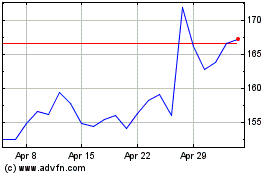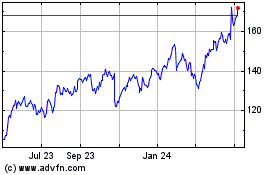By Valentina Pop
BRUSSELS -- Margrethe Vestager, the Danish politician who has
been the public face of the European Union's regulatory push
against Silicon Valley, has been nominated for a second, five-year
term as the bloc's competition commissioner.
The move was a surprise. Ms. Vestager was expected to hand over
the competition role -- a powerful post with hands-on
responsibilities for investigating and enforcing anti-competition
issues -- as she ascended to a higher role in the commission. She
will also take on an influential new role in shaping legislation
for digital companies.
Ms. Vestager made a name for herself by slapping record
antitrust fines on U.S. tech companies, including a total of $9.4
billion on Alphabet Inc.'s Google. She also ordered Ireland to claw
back $15 billion from Apple Inc. in what the commission called
unpaid taxes. That earned her the nickname "tax lady" from
President Donald Trump.
The division she has led for the last five years has pursued
high-profile probes against Amazon.com Inc., Facebook Inc. and
Qualcomm Inc., as well as non-tech American giants like McDonald's
Corp., Fiat Chrysler Automobiles NV and Starbucks Corp.
Ms. Vestager is slated to become one of incoming European
Commission President Ursula von der Leyen's three "executive"
deputies, in a move that is expected to provide the new president
with extra clout in commission deliberations. Her mandate over rule
making related to the digital economy could give her even more
influence over global tech regulation. Ms. Vestager confirmation by
the European Parliament is widely expected.
Regulatory rule making in Brussels and Washington has emerged as
a key issue facing the West's big tech giants, dominated by
American companies. Europe has taken a sizable lead over policing
Silicon Valley in recent years but the U.S. has also piled in on a
number of fronts in recent months. Several agencies, including the
Justice Department and the Federal Trade Commission, have taken aim
at tech companies, as have attorneys general across the
country.
Mrs. von der Leyen's administration has already signaled a push
for new laws on emerging technologies like artificial intelligence
and the use of big data. It has promised action on this front
within 100 days of taking office on Nov. 1. The commission, under
Ms. Vestager, is already probing how companies like Facebook and
Amazon.com use data gathered on their platforms. Both companies say
have done nothing wrong.
American tech companies have said they generally welcome greater
oversight. Apple Chief Executive Tim Cook last year in Brussels
attacked the "data-industrial complex" and called tighter privacy
regulation. Facebook has touted its new efforts to police the
content on its site.
But lawyers warned tech giants to brace themselves for more
European scrutiny.
The commission's focus on "digital giants is set to sharpen
further," said Alexi Dimitriou, competition counsel at Ashurst, a
multinational law firm. "With her remit also expanding to
coordinating wider digital policies, digital business should expect
regulatory intensity to continue," he said.
In another important appointment, Ireland's Phil Hogan is slated
to take over the bloc's top trade post, where he will be
responsible for negotiating future trade deals with the U.K. after
Brexit and with the U.S. Mr. Hogan, currently commissioner for
agriculture, has been a tough critic of Brexit and the U.K.
He is also an ally of Irish Prime Minister Leo Varadkar, who, in
a meeting with British Prime Minister Boris Johnson Monday,
repeated his vow to be Britain's strongest ally in securing a
post-Brexit trade agreement with the EU.
Mrs. von der Leyen said she was seeking a "geopolitical
commission," reflecting expectations among officials that she wants
the EU to project its ambitions globally and be less fixated
internally than in the past.
She officially unveiled other members of her new team on
Tuesday, with the most powerful players -- led by Ms. Vestager --
focused on redesigning rules to help European companies compete
with the U.S. and China and delivering a European version of the
Green New Deal.
The commission, which acts as the European Union's executive
branch, is in charge of negotiating trade deals, designing new
rules and regulations for the bloc and also acts as its top
anti-trust enforcer. Each EU country is represented by a
commissioner, except the U.K. which is set to depart the bloc on
Oct. 31.
As part of her Green New Deal pledge, Mrs. von der Leyen has
promised an economic plan focused on combating climate change that
envisions Europe becoming the world's first climate neutral
continent by 2050. She has tapped Frans Timmermans, a former Dutch
foreign minister, to be one of her other top deputies, leading that
portfolio.
"Those who act first and fastest will be the ones who grasp the
opportunities from the ecological transition. I want Europe to be
the front-runner," Mrs. von der Leyen said.
France and Italy, the second and third-largest economies in the
bloc once the U.K. leaves, are getting influential positions:
Sylvie Goulard, an early ally of President Emmanuel Macron and
currently the deputy governor of the Bank of France, will be in
charge of the internal market, defense industry issues and the
digital single market. Italy's former prime minister, Paolo
Gentiloni, will oversee economic affairs.
Mrs. Von der Leyen's team of 26 commissioners will still face
hearings in the European Parliament, which could result in some
names being withdrawn or reshuffled before the new commission takes
office.
The Parliament has already wielded some influence. Mrs. von der
Leyen has put the Green New Deal at the center of her policy agenda
in order to placate the rising number of climate-concerned
lawmakers before they voted on her becoming the next commission
president.
Mrs. Von der Leyen has pledged to aggressively cut emissions to
make the bloc carbon-neutral by 2050. She will propose a border tax
on carbon to protect European companies against global competitors
subject to less stringent emissions rules. And she wants to
transform the European Investment Bank--the EU's lending arm--into
a green financier that would help underwrite EUR1 trillion ($1.1
trillion) of climate-related investments.
Mrs. von der Leyen will have to secure buy-in from the poorer
Eastern European members, including Poland, that rely on coal to
fire their economies. She will also have to bridge policy
differences between France and Germany, with Paris pushing for a
rapid transition while Berlin advocates a more cautious
approach.
Write to Valentina Pop at valentina.pop@wsj.com
(END) Dow Jones Newswires
September 10, 2019 09:28 ET (13:28 GMT)
Copyright (c) 2019 Dow Jones & Company, Inc.
Alphabet (NASDAQ:GOOGL)
Historical Stock Chart
From Mar 2024 to Apr 2024

Alphabet (NASDAQ:GOOGL)
Historical Stock Chart
From Apr 2023 to Apr 2024
